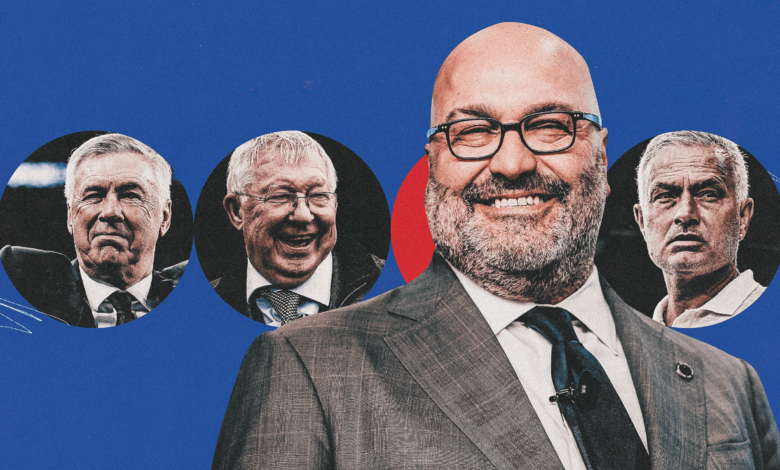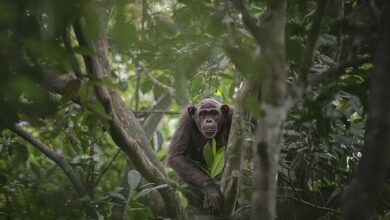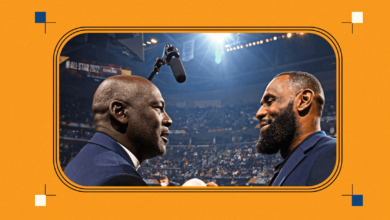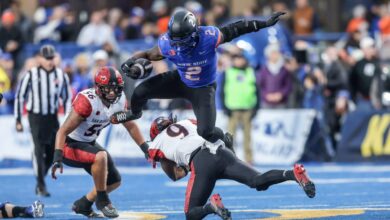Charlie Stillitano, football’s Mr Fixer and confidante to Ferguson, Mourinho and Ancelotti

It is late into a balmy summer’s evening when Sir Alex Ferguson, holidaying in Italy, welcomes a phone call from The Athletic. These days, media appearances by the former Manchester United manager, 82, are rare. But the opportunity to talk about a man he describes as “a huge personality” but also “a really good friend, trustworthy” is one he does not pass up.
The man in question is Charlie Stillitano, a 64-year-old Italian-American sports executive who has developed a network of coaching contacts within the football galaxy.
We meet for breakfast in a Manhattan cafe and over two hours, as he charts a life immersed in football, it becomes apparent why football’s most powerful and famous figures are so beguiled. In the words of Paddy Harverson, a former director of communications for Manchester United — and after that for the British royal family, when King Charles was still Prince Charles — Stillitano is “Mister Soccer”. To some of European football’s leading executives, he has become Mr Fixer; a man the suits trust to organise their multi-million dollar pre-season friendlies in the United States and a man the coaches rely on to secure the most desirable arrangements with facilities, travel and hotels.
His most recent role, taken up in June, is with TEG Sport, a live events promotion company that originated in Australia before expanding into the U.S. in 2024. Stillitano became an advisor in November 2023 and is now its global head of football. This summer, TEG has promoted fixtures between Manchester United, Liverpool and Arsenal in Los Angeles, Philadelphia and South Carolina, as well as Hollywood-owned Wrexham’s west coast tour of the U.S., which included games against Premier League sides Chelsea and Bournemouth. The idea is simple: pit the biggest teams against one another and offer U.S. supporters a glimpse of the sides they follow from across the Atlantic.

Stillitano’s stories dart and weave, between the decades, between star-name footballers, billionaire owners of sports teams and world-famous politicians. He talks about Pele and the day he turned down his No 10 jersey as a 13-year-old because the legendary forward had broken his heart when Brazil defeated Italy in the 1970 World Cup final. There’s the time he translated for Carlo Ancelotti when the Italian coach, who now manages Real Madrid, was secretly negotiating with Chelsea’s oligarch owner Roman Abramovich in 2008. He will tell you about hosting Ferguson at his home in New Jersey, and laying on the mama of all Italian spreads. And it is tempting to wonder, as he tucks into a banana and peanut butter sandwich, whether with all these stories, he might be having you on.
And, then, in the days after the interview, the calls and messages come in. Jose Mourinho replies within 60 seconds to a WhatsApp message asking if he would speak about Stillitano. “Since the first time I went on pre-season to the U.S. with Chelsea, I call Charlie ‘Mr No Mistakes’ because there were no mistakes. And normally when you go abroad with 60 people, moving from hotels to airports, the quality of the training pitches, mistakes can happen. But not with him.”
Mourinho would tell Stillitano to start the tour on the west coast and end it on the east, to finish with less jet lag, and ramp up the quality of the opposition as his players became fitter. On one occasion, Stillitano even ensured the University of California in Los Angeles (UCLA) built a swimming pool to comply with Mourinho’s specific pre-season needs.
“He had his own crew taking care of the grass,” Mourinho says. “We were flying from private airports to escape the airport queues — he perfectly understood the needs of a top football team. I remember the guys from Real Madrid — Cristiano Ronaldo, Xabi Alonso, Karim Benzema, Mesut Ozil — all these guys would say that next year, it has to be with Charlie again.”

Jose Mourinho came to trust Charlie Stillitano implicitly (Charlie Stillitano)
The next day, Ancelotti phones from his office in the Real Madrid training ground. He says he has been friends with Stillitano for 44 years, stretching back to when they first met when Ancelotti, as a player, turned out for Roma against the now-defunct New York Cosmos in 1980. They grew closer, he explains, when Stillitano became the New York venue director of the U.S. World Cup in 1994, when Ancelotti was the assistant coach of the Italy national team. Ancelotti continues the story about how he joined Chelsea. “He helped me in that special situation. I have never had an agent. And so sometimes, I ask some friends to help me in certain situations. A few times we met the directors of Chelsea, he was with me.”
Stillitano laughs: “I got a call from (then Chelsea chief executive) Peter Kenyon saying: ‘Do you know Carlo? Can you ask Carlo if he has an interest? But I need you. He doesn’t speak English. I need you to come and interpret.’
“So we went all over the place to some hotel in Belgium, like in the f****** woods. So we met; me, Carlo, Roman and Peter. And Roman would ask questions like: ‘Who do you like as a player? Do you like (Andrea) Pirlo?’ Carlo would say: ‘I like this guy, like that guy.’ We went through formations. I was like a little kid in a candy store. I wasn’t getting a penny for it.”
In the spring of 2013, he was privy to another Chelsea story that would stun world football. “When Jose agreed to go back to Chelsea, the only people who knew on earth were me, Roman Abramovich and Marina Granovskaia (a Chelsea executive at the time). Even Bruce Buck (then Chelsea’s chairman) did not know yet. And it was because Jose wanted Chelsea to play in our pre-season tournament. It wasn’t like: ‘You’re my friend, Charlie. I’m going to call you up out of the blue.’ He just needed me to save a place. I had to keep it a secret. And so I kept saying: ‘I don’t want to sign this team or that team; I want to just keep it open.’”
This might come across as tedious namedropping. But Stillitano has a manner of telling a story, often in childlike and playful wonderment, bewildered by the life that has befallen the son of a cookie-factory worker from New Jersey. It makes for compelling company. There are photographs of him and Ancelotti, arm in arm, walking through New York’s Central Park, and of Stillitano in deep conversation with Real Madrid president Florentino Perez and chief executive Jose Angel Sanchez.
With Ferguson, Stillitano has often been his guest, post-retirement, in the Old Trafford directors’ box. They were together in Stadio Olimpico’s smart seats in 2018 when Roma memorably defeated Lionel Messi’s Barcelona in the Champions League. They have posed together at weddings, wandered the streets of Rome and dined with Ancelotti in Madrid’s most exclusive restaurants. Ferguson jokes that Ancelotti, who has coached six clubs in five countries since 2009, has often changed his phone number but, if Ferguson needed it, he knew Stillitano would always have it. It all becomes a little surreal when Ancelotti and Ferguson, with their combined 22 top-flight titles and seven Champions League trophies, each turn conversation to the quality of Stillitano’s ragu — both men insist their own bolognese is even more impressive.

Charlie Stillitano and Sir Alex Ferguson have built a close relationship over 21 years (The Athletic)
“He’s a great cook,” Ferguson says. “You must go to his house for dinner. The only thing with Charlie, he’s got his table. It should only seat about five. And there’s seven or eight around the table! He dumps the food in the middle of the bloody table and everyone tucks in. Help yourself.
“His personality is the most important thing. His love of the game. His enthusiasm. From 2003, when we met, to 2024, he has not changed. It’s hard to do. He had a few bumps and bruises along the way, but he’s back in there. He does what he’s good at. He’s a fun-loving lad — you can’t help but like the man. And he’s been a really good friend to me. He’d do anything for you.”
According to David Gill, the former Manchester United chief executive — yes, he phoned too — football people grew not only to like Stillitano but also respect him.
“He might come across as this loud, brash Italian but he’s got a brain behind him,” says Gill. “He went to Princeton University (where he earned a degree in history and minored in economics). He loved the game. He wouldn’t be bulls******* them. He wouldn’t be making it up or learning on the fly. He could have a proper conversation with Ancelotti on Italian football or Sir Alex on the Premier League. It was a natural conversation, not a learned conversation.”
Stillitano’s life in football began through his father, who ran the Italian American Soccer League with his friends. Stillitano himself played in the German American Soccer League, with the Elizabeth SC. Pretty handy, too, by all accounts, playing alongside Bob Bradley, the former U.S. men’s national team coach, at Princeton.
He recalls watching Bobby Moore and West Ham United play exhibition matches in Jersey City. Then Santos and Pele came to town in 1973.

Charlie Stillitano, left, during his playing days at Princeton, seen here with his brother Leandro, who was playing for Columbia (Charlie Stillitano)
“They had seven players from the 1970 team. And they’re playing Lazio. It’s crazy. Pele was sooooo good,” says Stillitano.
Better than watching Lionel Messi?
“Yes,” he says, speeding up and telling a story about how Pele had to leave the field to avoid being mobbed. “I remember the vision of this incredible athlete in just little white underwear!” Then he recalls the time, with Santos 3-0 up against Lazio, that Giorgio Chinaglia steps up to take a penalty and Stillitano, a ball boy, is asked to get in goal with one of his friends.
“He kicks the ball between us into the goal,” Stillitano adds. “Now fast-forward, like, 45 years. I’m on the radio with Giorgio (Stillitano co-hosted a show on U.S. station Sirius XM). Someone said to me: ‘How’d you get involved in soccer?’ I said: ‘These games. It gets in your blood.’
“I’m telling this story. I said: ‘It finished 3-0.’ And Giorgio goes, very seriously: ‘It was 3-1. I scored a penalty kick.’
“I go: ‘Giorgio, I was in goal! A kid!’
“After the game, my uncle says Pele wants to give me his signed jersey. This is how nuts I am. I don’t want Pele’s jersey. You broke my heart when I was 10 years old. I never want to see this guy. He means nothing to me. Get him out of here. So it goes to my cousin. No regrets.
“Then, years later, I become friendly with Pele.”
In the mid-1990s, Stillitano became Major League Soccer’s first employee as the New York/New Jersey MetroStars’ (now the New York Red Bulls) general manager.
“And so we have lunch,” Stillitano continues. “Me, Lothar Matthaus, Pele, Giorgio Chinaglia and Prince Turki bin Khalid bin Faisal.”

Charlie Stillitano pictured with Brazilian legend Pele (Charlie Stillitano)
As in, the Saudi royal? “Don’t ask,” he laughs. “He was president of Saudi’s soccer federation. He was an important guy in that world, I’m not a royalist. I want you to know that I’m a republican. Small ‘r’.
“Anyway, so I tell the story of Chinaglia and Pele, and everyone’s cracking up. But Pele is not laughing. And I’m like: ‘What’s the matter?’ And he says: ‘You are the only person I know to ever refuse my jersey.’ And he is serious. Pele said: ‘Great players like Bobby Moore and Franz Beckenbauer would be asking me to switch jerseys.’ Instead, I’m a little jerk. My dad used to say to me: ‘You know why I love you, son?’ I say: ‘Why, Papa?’ He said: ‘Because you have one face.’
“I’m always going to be true to who I am. Anyway, the next week, I get a delivery. ‘To my dear friend. Para mi amigo, Charlie.’ It is an original Brazil jersey with Pele’s f****** autograph on it sent by him. I got it framed. Beautiful. So now I can still have one face and have Pele’s jersey.”
Stillitano understood that sports fans in the U.S. would spend money to access big names. The challenge was, and remains, turning a profit for a promoter while doing so. When running the MetroStars, he and his late brother Leandro organised the Parmalat Cup at Giants Stadium (replaced by MetLife Stadium, the venue for the 2026 World Cup final) involving Italian side Parma, Argentinian club Boca Juniors, Portuguese team Benfica and the U.S. men’s national team.
This was 1995, with the USMNT capturing the imagination a year earlier at a home World Cup. Now they were playing against Gianfranco Zola and Hristo Stoichkov. Stillitano says the take-up was largely through immigrant communities, with New Jersey home to vast Portuguese and Italian communities desperate for a glimpse of their heroes.
“We were the first ones to use virtual advertising in the world. And the next day, FIFA (football’s world governing body) sent out one of their circulars. Stop. No more virtual advertising — because they didn’t know what it was. Princeton Video Imaging came up with this product and now it’s everywhere.”

The MetroStars adventure was not a success on the pitch, finishing bottom of their conference twice in their first four years. In 2000, Stillitano pivoted. He set up the ChampionsWorld Series, and dedicated himself full-time to exporting European club-friendly matches to the U.S.
First, he aided a partnership between Manchester United and the New York Yankees, bringing together the two biggest sporting brands in the world at the time. As part of the agreement, ‘Manchester Mondays’ took off on the YES Network, meaning United’s full games would become available to watch on the Yankees’ TV station within 24 hours of their games back in England. This was long before the Premier League had a U.S. television deal, as they do now with NBC, which yields $450m (£351m) per season.
In 2002, he had firm proof of concept. He organised a friendly between Roma and Real Madrid. “We worked with the United Nations general secretary Kofi Annan, (former U.S. secretary of state) Henry Kissinger and Pele,” he begins.
OK…
“The most bizarre thing you’ve ever seen. I brought all these people together and we did the fight against HIV/AIDS. My brother again, brilliant. He said: ‘Why don’t we do something that means something?’ So many people in the community had lost friends. So we convinced Franco Sensi, who owned Roma, and Madrid president Florentino Perez. They donated their revenues and we donated our revenues.”
Crucially, both teams fielded their stars; Gabriel Batistuta, the wild-haired Argentinian forward, played for Roma; Zinedine Zidane and Roberto Carlos played for Madrid. It raised $375,000.
“It was the weirdest night because Henry Kissinger kept saying: ‘Charlie, call me Hank’, ‘Charlie, get me a hot dog.’ So I’m running around getting hot dogs.
“Then I had my best dad joke ever. So it’s literally Pele, Henry, Kofi and me. Who doesn’t belong in this picture? It’s me. Kofi says: ‘I love this. We should find a cause every year.’ We almost did something with Israel and Palestine in New York for peace. I said I’d love to do it, but I said: ‘Kofi, I was going to name the event after you.’ He looks at me curious. I said: ‘But it just wouldn’t be right to name it after you.’ He’s like, yes, it’s awkward because I am the general secretary. I said: ‘No, no, it’s nothing to do with that. We’d have to call it the Coffee Cup.’ He thought it was the best joke. I thought Henry Kissinger was going to fall on the ground.”
ChampionsWorld, however, was not a financial success. Set up through a second mortgage on Stillitano’s home, the company filed for bankruptcy in 2005, owing more than $2m, largely to the U.S. Soccer Federation, which took large sanctioning fees for every match fielded in the country. The company attempted to sue, claiming U.S. Soccer and MLS had jointly conspired to crush the business, but a seven-year dispute was ultimately settled out of court.
Before that, though, he brought Ferguson’s United to the U.S. in 2003. United were a sensation, riding high after the 1999 treble win. Stillitano had followed United on a tour of Asia a year earlier and witnessed how the players were mobbed by supporters. America, however, was the final frontier.
It probably did not inspire huge confidence in the marketeers when David Beckham was sold to Real Madrid at the start of the summer. United had visited the U.S. in previous decades but expeditions were largely built around the Far East or northern Europe. In America, Ferguson and his players had relative anonymity. Roy Keane organised a private car to take himself and team-mates to see Bob Dylan perform in Los Angeles after United beat Club America.
“I remember walking around Pennsylvania and nobody knew who you were,” Ferguson laughs. “If I walk down the street in Wigan or somewhere, it doesn’t matter where you go, anywhere in Europe and you’re identified quite quickly.”
The matches were a stunning success. A crowd of 79,005 watched United — and their new American goalkeeper Tim Howard — beat Juventus 4-1 in the largest crowd for a soccer match at Giants Stadium.

Manchester United line up Giants Stadium in 2003 (Matthew Peters/Manchester United via Getty Images)
“Everywhere we went that first year it was full houses,” Ferguson says. “And by doing that, it has created quite a large fanbase in the U.S. for Manchester United. It paid its price in the sense of bringing American supporters into the European scene.”
Former United chief executive Gill explains that Stillitano would attract funders for the game and the model would guarantee a match fee for United, which ChampionsWorld would underwrite — essentially, de-risking the events for the clubs involved.
To attract teams, Stillitano relied on connections. “I basically relied on a friendship. I had these big coaches have dinner together and it was f****** awesome. When Juventus played Manchester United, I sit and translate for Marcello Lippi and Sir Alex, two guys who admired each other.”
Harverson, United’s former director of communications, says: “There was a big dinner, Harry Cipriani’s downtown. A great big party. And there was Charlie at the heart of it. He’s the best person to go for dinner with in New York. You go with him to an Italian restaurant in Manhattan and you have an absolute ball — everyone knows him. He knows the chef, he knows the owner, he knows the waiters, he knows the barman. And they all want to do the best for him and him for them.”
Stillitano’s company was briefly knocked out of the game — but then came an opportunity, joining Creative Artists Agency (CAA), which promoted the games for five years as the World Football Challenge, before the rights were sold to Relevent Sports and Entertainment, owned by the Miami Dolphins owner Stephen Ross. Stillitano was hired, and then came the International Champions Cup, a tournament that ran until 2019, promoting and organising games in the U.S., but also in Asia and Australia. They also promoted international fixtures, attracting Ronaldo’s Portugal to the U.S. for friendly games in 2014.

Charlie Stillitano pictured at the International Champions Cup game between Manchester United and Real Madrid in 2018 (Ira L Black/Corbis via Getty Images)
Not everybody was initially sold by these summer tours. Arsene Wenger did not want Arsenal to follow the trend. “He kept saying, ‘We’re not Man United, we’re not going to open up a supermarket’,” Stillitano recalls.
When Barcelona first planned to come to the U.S., Frank Rijkaard, the team’s head coach, called Stillitano and said they would not be playing in his tournaments. “I said: ‘Why not?’ His answer was that we had him playing Juventus, AC Milan and Manchester United. And he said to me: ‘I’m going to get fired before the season starts.’ This was the mentality. I remember Sir Alex saying to me: ‘I’ll never play Liverpool in pre-season.’”
Real Madrid, too, were resistant to playing domestic or European rivals in pre-season. They feared it would place undue pressure on the team at a point that should be reserved for preparation. Stillitano talked them around. This summer, Manchester United play Liverpool in South Carolina, in a game promoted by TEG. Tickets sold at a quicker pace than a Beyonce concert previously held at the same venue in 2016. Madrid, meanwhile, will face Barcelona at MetLife Stadium.
Relevent and Stillitano brought El Clasico, the most iconic fixture in club football, to Miami’s Hard Rock Stadium in 2017, the first time Barcelona and Real Madrid had played each other outside Spain for over three decades. Ticket sales, according to a senior Madrid executive who requested anonymity because of the sensitivity of the matter, brought in $36.6million. A sellout crowd of 66,014 saw Barcelona beat Madrid, with Messi scoring, and celebrities attended, including Serena Williams, Tiger Woods, Drake and 40 Miami Dolphins players. ESPN’s live coverage in the U.S. of the first El Clasico to be played on American soil delivered 1.7million viewers.
Relations between Relevent and Stillitano, however, appeared to sour. A legal case emerged, alleging Stillitano, who had been Relevent’s executive chairman until his departure in spring 2021, had breached a non-compete clause after his exit. The matter is now considered closed and resolved. But Stillitano’s relationship with UEFA, European football’s governing body, also suffered during that legal case, as text messages emerged in which the UEFA president Aleksander Ceferin warned his organisation would not deal with him if he pursued friendly matches in the U.S. involving European Super League breakaway teams Real Madrid, Juventus and Barcelona.
This summer, the Copa America was held in the U.S. It experienced challenges with organisation, promotion and safety. “That’s because Charlie was not involved,” Ancelotti quips. Next summer, FIFA brings a Club World Cup to the U.S., but preparations have been hampered by a failure to announce a broadcaster or venues. Stillitano is, unusually, tight-lipped when asked if he might have a role either for that tournament or the World Cup in 2026.

Charlie Stillitano with Carlo Ancelotti in New York’s Central Park (Charlie Stillitano)
For TEG, the pre-season games continue. This year, it also promoted and organised a match between rugby union’s New Zealand All Blacks and Fiji in San Diego, and partnered with the International Cricket Council to deliver the U.S. portion of the 2024 Men’s T20 World Cup. TEG organised eight matches in New York at Eisenhower Park in Nassau County, including the sport’s highest-profile fixture: India versus Pakistan.
TEG say they want to be market leaders in cricket, rugby and football. “And the partner of choice for the US major leagues, who look to expand to international markets,” says Bart Campbell, TEG’s Global Conttent Director. “We took the NHL to Australia last year. We’ve taken the U.S. men’s basketball team to London to play at the O2 against South Sudan and Germany in their run-up to the Olympics.” In Stillitano, Campbell says, they have hired someone whose “greatest gift is that people trust him, because he’s gone above and beyond for them”.

GO DEEPER
How cricket became the next big thing for sport’s wealthiest investors
Cricket will be in the Olympics for the 2028 Games, primarily hosted in Los Angeles. Stillitano says: “But we were with Governor Phil Murphy of New Jersey the other day to talk about everyone saying the cricket Olympics are going to be on the east coast. So we’re making a pitch for them because there is this huge diaspora of cricket fans.”
He pauses, and smiles. “A lot of the things I did in football, we can translate. And along the way, we can keep having fun.”
(Top photos: Getty Images)




